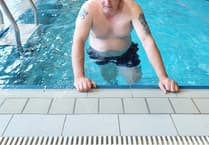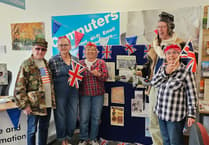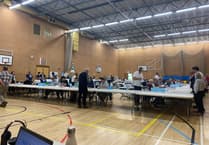AFTER 15 years, an Ivybridge charity born out of one man’s solo journey with a hinny called Henry is poised to go national with its unique service to those in direst need.
Ivybridge man David P Snelling started pancreatic cancer charity Operation Henry in 2001. His father had earlier died of the disease, and David committed himself to one day starting an organisation that would provide help and support to sufferers, as well as raising awareness of the little-known but deadly cancer.
Just before setting up the charity, David undertook a 2000km trek across France and Spain accompanied by Henry the hinny, a journey that gave him ample time to ponder the finer details.
His experiences with the trusty beast – the offspring of a male horse and a female donkey – not only gave David a name for the charity, but plenty of fodder for subsequent public speaking appearances and fundraising presentations.
Run from his home initially, before moving to offices in the centre of Ivybridge, Operation Henry is based on a network of people who are able to assess the needs of pancreatic cancer patients. In the South West, dedicated hospital liaison staff meet patients to get an idea of how they can be helped while in other areas the charity relies on clinical nurse specialists and hospice staff for assessment.
The aim is to find out what the charity can provide that would help patients and their families deal with the stress, trauma and financial anxiety of a diagnosis of pancreatic cancer. But once an assessment is made and Operation Henry staff have digested the resulting report, there is no limit to the type of help that can be offered, whether financial or personal.
As David himself said: ’There is no box, no cut-and-dried procedure. It’s about improving people’s quality of life, but in terms of needs, not wants.
’That’s why we send an assessor for a face-to-face chat. There’s no clipboard – they sit down and have a cup of tea and a conversation, and then we decide how we can satisfy their needs.’
Head of fundraising Marina Leadbetter added: ’It is known that when someone is diagnosed they incur on average £600 in extra costs. We can help with that, which can alleviate a lot of stress.’
The charity believes that family support is of the utmost importance, and has helped family members with transport to visit or care for relatives with pancreatic cancer. Among many other things, Operation Henry has also liaised with local authorities on behalf of beneficiaries to address housing issues, facilitated patients taking up much-loved hobbies in their final weeks, and helped beneficiaries and their families take much-needed holidays.
Claire Goulding, a nurse at Derriford Hospital in Plymouth said that she ’wholeheartedly supports’ Operation Henry and the work it does. She said: ’The support and services they provide to people diagnosed with pancreatic cancer and their families are invaluable.
’Examples of this are providing transport to and from Derriford for appointments, financial assistance with day to day living costs and home help. They have also supported patients in their hobbies when there has been a financial or practical restriction, to enhance their quality of life. They are able to provide that little bit extra support that can make a real difference to their lives.’
Angela Bamber from Wembury knows first hand the difference the charity’s work can make. She said: ’My treatment for the cancer involves chemotherapy treatment three times a month, for the next six months. The stress of facing this was compounded by the worry of getting parked at Derriford, and then getting home after treatment when I usually feel extremely unwell due to the effects of the chemotherapy.
’However this worry and stress was completely alleviated by contact with Sophie at Operation Henry. They arranged a kind volunteer driver, Peter, who took control of getting me to and from my treatments as well as keeping me company throughout the duration of them.
’Thank you for the support, Operation Henry, in sponsoring this wonderful service.’
After 15 years of leading the charity, and approaching his 75th birthday, founder David is now preparing to take a back seat while Operation Henry goes national. He has personally recruited a charity manager, head of IT and fundraising manager: the charity’s executive, which will lead its expansion.
The aim is to extend help to 75 pancreatic cancer patients nationwide by next year, something that will also require a sharp increase in the £300,000 the charity raised last year.
In order to expand its service nationally, the charity is looking for more people, ideally with nursing experience, to act as hospital liaison personnel up and down the country. As David says, ’we have to build the house on sound foundations – for us, that is the effectiveness of our liaison people, so we can rely on their assessments’.
The charity will also continue to work to improve awareness of pancreatic cancer among both health professionals and the general public. David believes that everyone should take be more aware of their own health, but also realises that everyone is susceptible: saying that he ’has no difficulty in being human’, he revealed that he is himself suffering from prostate cancer.
David said: ’I have to hand over responsibility, but the charity is going from strength to strength. We are small but we have a personal relationship with our donors, and we fund palliative care not research. We can say to people, this is how your money is being used.’
Marina added: ’Without all the support from our community Operation Henry would not be able to deliver our important and much needed services. If you would like to support the charity please get in touch via [email protected]. You can fundraise through your work place, organise an event, or donate directly to www.operationhenry.org.’
The charity is also very grateful for the ongoing support of Portcullis Legals, The Dolphin Inn, Kingston, McClure Solicitors, Lockstone Print, Salcombe Dairy Ice Cream, and business owners Peter Simmons and Rich Scanlon.




